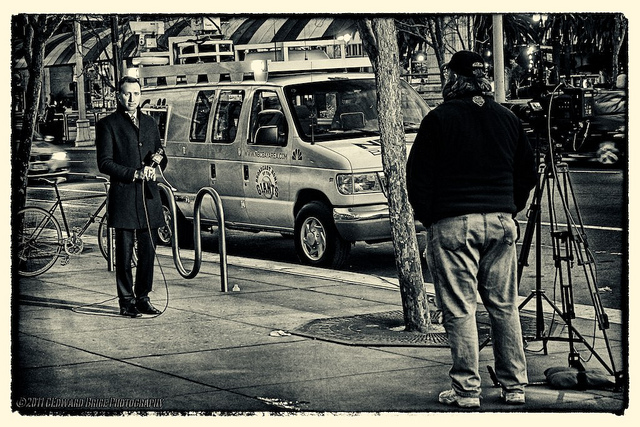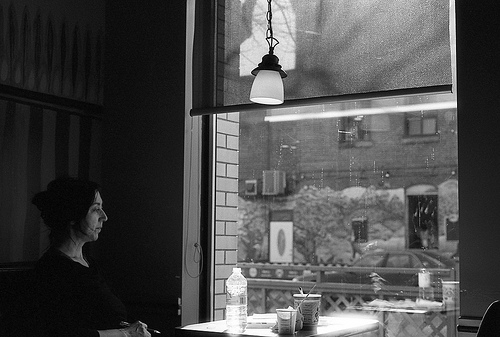
When I posted the other day about how Mike Reeves-McMillan got honest book reviews he mentioned having put together a press kit.
Having a press kit seems like a great idea since it means you'll have all the important information about both yourself and your books in one place for anyone interested to browse through.
Also, having a press kit makes it easy for the author when she/he needs to send information about the book to someone months--or years--after the launch. There's no wondering which directory the information is in, no panicked searches (or perhaps that's just me!). You know where all the information is and it's easy for anyone to access.
So, what, exactly, should go into a press kit?
Building A Press Kit: Author Information
In her article, Book Marketing: Creating Your Author Press Kit, Tolulope Popoola discusses how to put together your own press kit.
1. Author biography
I hate writing these! But it is one of the first things people want to know. What's your background, what kind of books do you write, how did you become a writer?
Tolulope writes:
Your author bio should be about 200 words, and it should have things that make you sound interesting and professional. You should include your name, your place of birth or where you currently live, what you do (or used to do) for a living, what you’ve written, perhaps your education (if it’s relevant), quirky hobbies, or interesting travel experiences. Basically, anything that will make you stand out.This would also be a good place to list any relevant awards, were any of your previous books best-sellers, and so on.
2. Contact information
How can folks get a hold of you? A website? Blog? Twitter? Facebook? Also, list your agent if you have one.
3. Press release
Steven Lewis advises writers to pay less attention to what your book is about than to what it can do for your readers. Also, consider what market, what demographic, would be most interested in your book.
4. Sample author Q&A
Writers, bloggers especially, are always hungry for more information, so give them some! Tolulope writes:
Make a list of interview questions (and responses) about you and your book. This can include questions about your background, your inspiration for writing this book, why you chose to self-publish, your own favorite writers, future projects, etc. This section is particularly helpful for the interviewer and bloggers who want to help you promote your work, as it’s useful and ready content for them.
Building A Press Kit: Book Information
Book sample
Provide up to three chapters. As for what format you should offer them in, Tolulope made a PDF available for download, but I would suggest making your sample chapters available in as many formats as possible.
If you're having trouble converting your book from one format to another, you could try Calibre. The program is free and it's awesome.
Cover image
Often if a person is writing about your book they'll want a picture, so it's a good idea to provide the cover image. I don't think you need to provide this in many different formats, a jpg should be enough.
Where the book can be found on the web
List wherever your book can be bought as well as other sites it is featured on, sites such as Goodreads.
Sample reviews
Provide excerpts from reviews along with a link to the full text on the web.
The books "one line"
This is one line that sums up the primary conflict in your novel. For instance, they used to write a one line description of a movie on the can a reel of film was stored in that described the movie.
Nathan Bransford has written excellent how-to articles about how to summarize your book in a sentence. (see: How to Write a One Sentence Pitch)
Brief Book Summary
This is generally quite short, something under 200 words or so. For example, this is Nathan Bransford's brief book summary for Jacob Wonderbar.
Jacob Wonderbar has been the bane of every substitute teacher at Magellan Middle School ever since his dad moved away from home. He never would have survived without his best friend Dexter, even if he is a little timid, and his cute-but-tough friend Sarah Daisy, who is chronically overscheduled. But when the trio meets a mysterious man in silver one night they trade a corn dog for his sassy spaceship and blast off into the great unknown. That is, until they break the universe in a giant space kapow and a nefarious space buccaneer named Mick Cracken maroons Jacob and Dexter on a tiny planet that smells like burp breath. The friends have to work together to make it back to their little street where the houses look the same, even as Earth seems farther and farther away.
Longer Book summary
This can be as much as 5,000 words or so that summarizes what happens in each chapter of your book (in other words, a synopsis) or it can be a book summary like you did above, just a bit longer. If you're like me you started off with a longer description and had to whittle it down to the essentials so you already have it.
Some sites (Smashwords for example) allow you to post both long and short descriptions so it's handy to have both, just in case.
By the way, this article of Nathan Bransford's is, hands down, the most helpful article I've read on summarizing a novel: The One Sentence, One Paragraph, and Two Paragraph Pitch. Also, see his article on how to write a one sentence pitch.
Example of a press kit
Tolulope included a link in her article to Michael Hyatt's press kit.
That's it!
What advice would you give a new author interested in assembling a press kit?
Other articles you might like:
- Chuck Wendig On Fairy Dross And Pegasus Dreams- How To Write A Critique: The Sandwich Method
- How Robert J. Sawyer Writes A Novel
Photo credit: "The Reporter" by CEBImagery (dot) com under Creative Commons Attribution 2.0.




